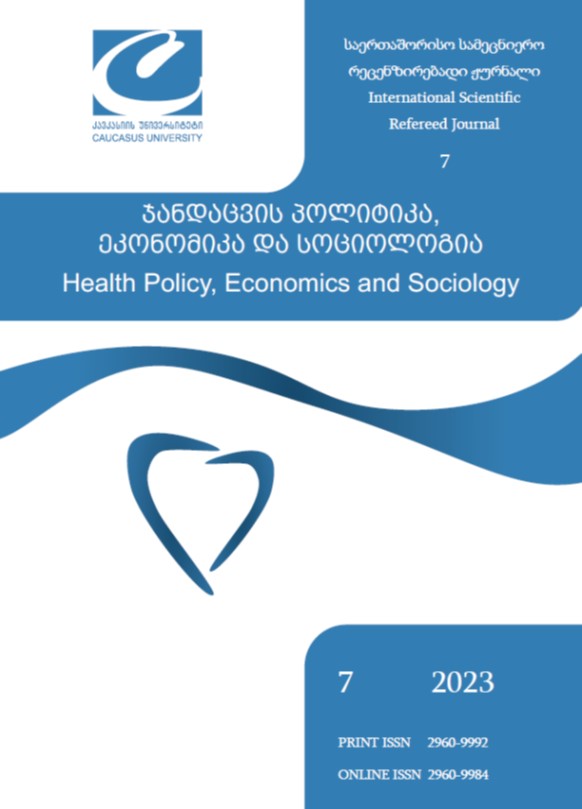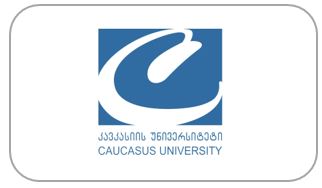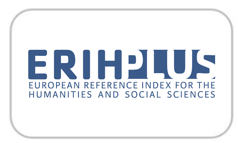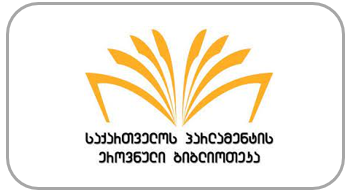სტუდენტთა ცოდნისა და დამოკიდებულებების კვლევა COVID-19 ვაქცინაციის მიმართ
საკვანძო სიტყვები:
ინფექციური დაავადებები, იმუნიზაცია, ეპიდემია, COVID-19 ვაქცინაციაანოტაცია
შესავალი: ეპიდემიური სიტუაციების დროს ვაქცინა ვირუსთან ბრძოლის მთავარი და ყველაზე ეფექტური საშუალებაა. კვლევის მიზანს წარმოადგენს სტუდენტების ცოდნისა და დამოკიდებულებების შესწავლა ვაქცინაციის მიმართ. მეთოდოლოგია: ჩატარდა სოციოლოგიური კვლევის თვისებრივი მეთოდი, კერძოდ სიღრმისეული ინტერვიუ და ფოკუს-ჯგუფი. შედეგები: გამოკითხულ რესპონდენტთაგან უმეტესობა ფლობს სწორ და მეცნიერულად დამტკიცებულ ინფორმაციას იმუნიზაციის შესახებ და მათ დადებითი დამოკიდებულება აქვთ ვაქცინაციის მიმართ. ყველა რესპონდენტს გაკეთებული აქვს გეგმიური აცრები და მათი უმრავლესობა აცრილია COVID-19-ის საწინააღმდეგო ვაქცინით. რესპონდენტთა ცოდნასა და დამოკიდებულებას უმეტესწილად განსაზღვრავს განათლების დონე, საზოგადოება, ოჯახი და ინფორმაციის ნაკლებობა. დასკვნა: საჭიროა საზოგადოების ცნობიერების ამაღლება და ცრუ და რეალური ინფორმაციის ერთმანეთისგან გამიჯვნა. სასურველია მასობრივი კომუნიკაციის საშუალებების და სოციალური ქსელების ფოკუსირება სწორი და მეცნიერულად დამტკიცებული ინფორმაციის გავრცელებაზე.
წყაროები
გოგიჩაძე გ. (2011). ლექსიკონი ბიოლოგიური და სამედიცინო ტერმინები და ცნებები. თბილისი. მერიდიანი. 442გვ
ვერულავა, თ. (2017). ჯანდაცვის სოციოლოგია. ჯანდაცვის პოლიტიკის ცენტრი.
საქართველოს ოკუპირებული ტერიტორიებიდან დევნილთა, შრომის, ჯანმრთელობის და სოციალური დაცვის სამინისტროს ლევან საყვარელიძის სახ. დაავადებათა კონტროლის და საზოგადოებრივი ჯანმრთელობის ეროვნული ცენტრის სამედიცინო სტატისტიკის დეპარტამენტი. (2021). ჯანმრთელობის დაცვა საქართველო.(38-42).
Baumeister RF, Leary MR. (1995). The need to belong: Desire for interpersonal attachments as a fundamental human motivation. Psychological Bulletin, 117, 497–529.
Fine PE. (1993). Herd immunity: history, theory, practice. Epidemiologic reviews, 15(2), 265-302
Hussain A, Ali S, Ahmed M, Hussain S. (2018). The anti-vaccination movement: a regression in modern medicine. Cureus, 10(7).
Jenner E. (1801). On the origin of the vaccine inoculation. The Medical and physical journal, 5(28), 505.
Kata A. (2010). A postmodern Pandora's box: anti-vaccination misinformation on the Internet. Vaccine, 28(7), 1709-1716.
Pelčić G, Karačić S, Mikirtichan GL, Kubar OI, Leavitt FJ, Cheng-Tek Tai M, Morishita N, Vuletić S, Tomašević L. (2016). Religious exception for vaccination or religious excuses for avoiding vaccination. Croatian medical journal, 57(5), 516–521
Riedel S. (2005). Edward Jenner and the history of smallpox and vaccination. In Baylor University Medical Center Proceedings 18(1): 21-25.
Rothman KJ, Greenland S, Lash TL. (2008). Modern epidemiology (Vol. 3).
Smith DR. (2019). Herd immunity. Veterinary Clinics: Food Animal Practice, 35(3): 593-604
Shrestha R, Chhettri P, Bhusal CK, Ruchal R, Shrestha S, Shrestha B. (2019). Knowledge, Attitude and Practice Regarding Immunization among Medical Students. Journal of Universal College of Medical Sciences, 7(1):46-50.
Verulava T, Jaiani M, Lordkipanidze A, Jorbenadze R, Dangadze B. (2019). Mothers’ Knowledge and attitudes towards child immunization in georgia. The Open Public Health Journal, 12(1).
HWO: vaccines and immunization. https://www.who.int/health-topics/vaccines-and-immunization#tab=tab_1
WHO: How are vaccines developed?
https://www.pfizer.com/news/articles/how_are_vaccines_developed
ჩამოტვირთვები
გამოქვეყნებული
როგორ უნდა ციტირება
გამოცემა
სექცია
ლიცენზია
საავტორო უფლებები (c) 2023 დეა ნიჟარაძე

ეს ნამუშევარი ლიცენზირებულია Creative Commons Attribution-ShareAlike 4.0 საერთაშორისო ლიცენზიით .













